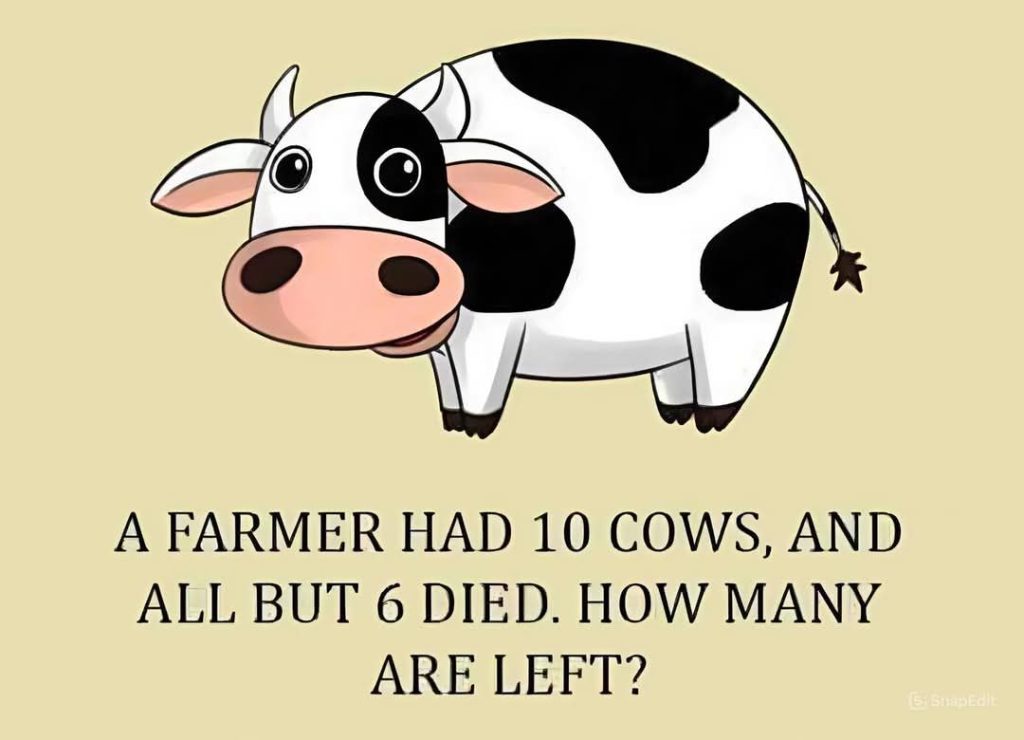Riddles have a way of twisting words, challenging logic, and making us second-guess even the simplest math problems. One such riddle that has been stumping people online is:
“A farmer had 10 cows, and all but 6 died. How many are left?”
At first glance, many people rush to do the math and confidently answer 4—thinking they simply need to subtract 6 from 10. But hold on! This is a wordplay riddle, not a math problem!
Let’s break it down carefully and uncover the correct answer that has fooled so many.

Understanding the Trick Behind the Riddle
The key to solving this riddle lies in reading the sentence carefully. The phrase “all but 6 died” is where most people get confused. Instead of thinking mathematically, let’s break it down step by step.
- The farmer originally had 10 cows.
- The phrase “all but 6” means all except 6 died.
- If all except 6 died, then that means 6 cows survived!
So, the correct answer is:
👉 6 cows are left! 🐄🐄🐄🐄🐄🐄
Video: A farmer has 17 sheep and all but 9 die. How many are left?
Why Do People Get This Riddle Wrong?
This riddle tricks the brain because it sounds like a math problem at first. Our instinct is to immediately subtract 6 from 10, which leads to the incorrect answer of 4.
However, this isn’t about subtraction—it’s about understanding the meaning of the phrase “all but 6”.
Common Mistakes People Make:
❌ They think it’s a subtraction problem – People assume “all but 6” means “take away 6” instead of keeping 6.
❌ They misinterpret “all but” – Many don’t realize that “all but” means “everything except”, which flips the meaning entirely.
❌ They rush to answer – This riddle is designed to mislead quick thinkers who don’t take a second to read carefully.
How Wordplay Riddles Trick Your Brain
Riddles like this one use linguistic tricks to confuse logic and perception. The way our brains process language is often based on patterns and past experiences, which is why this question triggers an automatic mathematical response.
Here’s why it works so well as a brain teaser:
🔹 Expectation vs. Reality – We expect the riddle to be a subtraction problem, so we don’t stop to analyze the words carefully.
🔹 Cognitive Bias – Our brains look for shortcut solutions, leading us to a fast but incorrect answer.
🔹 Ambiguous Wording – The phrase “all but 6” is intentionally designed to sound misleading.
Video: A farmer has 20 cows and all but six run away. How many are left?
Other Fun Riddles That Use Wordplay
If you enjoyed this tricky riddle, here are some other famous brain teasers that work in a similar way:
💡 Riddle #1: A father and his son were in a car accident. The father died, but the son was rushed to the hospital. The doctor said, “I can’t operate on this boy. He’s my son.” How is this possible?
🧠 Answer: The doctor is his mother! (This riddle plays on gender assumptions.)
💡 Riddle #2: What has to be broken before you can use it?
🧠 Answer: An egg! (The trick is in reinterpreting the meaning of “broken.”)
💡 Riddle #3: I speak without a mouth and hear without ears. I have no body, but I come alive with the wind. What am I?
🧠 Answer: An echo! (A classic example of a riddle that plays on metaphors.)
These riddles challenge you to think beyond the obvious and avoid falling into mental traps.
How to Improve Your Riddle-Solving Skills
Want to get better at solving tricky riddles like this one? Here are a few tips to sharpen your mind:
🔍 Read carefully – Don’t rush! Take a moment to analyze each word in the question.
🧠 Look for hidden meanings – Riddles often use double meanings, metaphors, or unexpected wordplay.
🤔 Question your assumptions – If an answer seems too obvious or too mathematical, double-check if there’s a trick involved.
📖 Practice with more riddles – The more you train your brain to recognize patterns and wordplay, the better you’ll become at spotting these tricks instantly.
Final Conclusion: The Power of Thinking Outside the Box
The “10 cows” riddle is a brilliant example of how simple wording can completely change our perception of a question. Instead of being a math problem, it’s actually a clever linguistic trick designed to mislead those who read too quickly.
🎯 Final Answer: 6 cows are left!
Riddles like this remind us that not everything is as straightforward as it seems. Whether it’s in puzzles, conversations, or even real-life decisions, taking a moment to slow down and think critically can often lead to the right answer.
So, were you fooled by this riddle at first? Or did you catch the trick right away? Share your thoughts in the comments below! 😆🔥